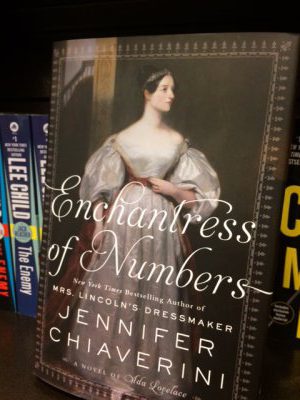
Ada's parents separated in 1816 (due to Lord Byron's bad behavior which led to a very complicated family situation) when she was an infant and she never saw her father again. Unfortunately, it was a pretty uninteresting childhood. I have a problem with books told from the pov of a child who has total recall of all conversations and events that occurred when she was a toddler.

Since the author obviously has little interest in science, I had to look Ada up on Wikipedia to find out what she actually did.Īfter the prologue, the rest of the book is written in the form of a memoir by the 35 year old Ada. We just have to take for granted the fact that she was a good mathematician. The emphasis was definitely on her childhood and then on her duties as wife, mother and countess. Not until the end of the book do we see Ada actually performing any scientific work. I was expecting more about the life of a scientist or a glimpse into her creative process but there is almost none of that in this book. I had never heard of Ada, but some have credited her with being the first computer programmer. All the while, she passionately studies mathematics-ignoring skeptics who consider it an unusual, even unhealthy pursuit for a woman-falls in love, discovers the shocking secrets behind her parents’ estrangement, and comes to terms with the unquenchable fire of her imagination.Īn overly long prologue to this book tells the story of the courtship and brief unhappy marriage of Lord Byron and his wife Annabella that resulted in the birth of one child, Augusta Ada later known as Ada Byron King, Countess of Lovelace. Intrigued by the prototype of his first calculating machine, the Difference Engine, and enthralled by the plans for his even more advanced Analytical Engine, Ada resolves to help Babbage realize his extraordinary vision, unique in her understanding of how his invention could transform the world.

Little does she realize that her delightful new friendship with inventor Charles Babbage-brilliant, charming, and occasionally curmudgeonly-will shape her destiny. When Ada is introduced into London society as a highly eligible young heiress, she at last discovers the intellectual and social circles she has craved all her life. Any troubling spark of imagination-or worse yet, passion or poetry-is promptly extinguished.

Banishing fairy tales and make-believe from the nursery, Ada’s mother provides her daughter with a rigorous education grounded in mathematics and science. Estranged from Ada’s father, who was infamously “mad, bad, and dangerous to know,” Ada’s mathematician mother is determined to save her only child from her perilous Byron heritage. The only legitimate child of Lord Byron, the most brilliant, revered, and scandalous of the Romantic poets, Ada was destined for fame long before her birth.


 0 kommentar(er)
0 kommentar(er)
